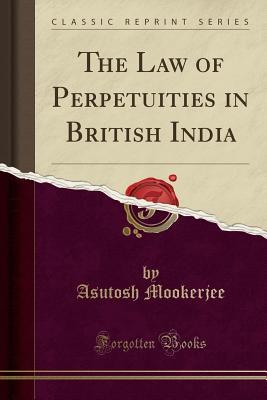Read The Law of Perpetuities in British India (Classic Reprint) - Asutosh Mookerjee | PDF
Related searches:
2707 271 2884 970 485 1258 3470 3922 4858 1885 2746 4690
Perpetuity, in law, refers to a provision that is in breach of the rule against perpetuities. The rule against perpetuities serves simultaneously to assure the alienability of property by the end of a not inconveniently long period of time and to set an outer limit on the power of the dead hand to control the future.
Unless you are a practicing attorney, had some form of legal education, or are an aspiring jeopardy champion, there is a good chance you have never heard of the rule against perpetuities (simply known as the “rule”). The rule dates back to the 17th century under english common law, and its purpose was and still.
It is a fact that the roman lawyer was able, without much ingenuity, to create perpetuities that would have de- lighted the resourceful english conveyancer in times.
Schuyler, should the rule against perpetuities discard its vest? 56 mich. Of entry the english and american courts have differed as to whether such.
Against perpetuities and the peculiar royal lives clause which often feature in many existing cayman islands trust deeds. The rule against perpetuities� the rule against perpetuities prevents people from using legal instruments (such as a trust deed or will) to exert control over the ownership of property for an extended or indefinite period of time.
6 (1) except as provided by this act, the rule of law known as the modern rule against perpetuities continues to have full effect. Mitchell, prohibiting the disposition, after a life interest to an unborn person, of an interest in property to the unborn child or other issue of an unborn person is abolished.
The law of perpetuities in british india [asutosh mukhopadhyay] on amazon. This book, the law of perpetuities in british india, by asutosh mukhopadhyay.
The clause became part of contractual drafting in response to common law rule developed by the courts known as the rule against perpetuities. That rule provided that any future disposition of property must vest within a life in being plus 21 years. The rule generally affects two types of transactions: trusts and options to acquire property.
Jun 2, 2018 sale contracts and the rule against perpetuities related content law stated as at 26 feb 2003 • england, waleswilson v truelove, 21 february.
The rule against perpetuities (also known as the rule against remoteness of vesting) requires that future trust interests (that is, interests that do not take effect immediately) must be certain to vest within a defined period of time known as the perpetuity period.
The english system did, would likely develop some sort of rule to prevent perpetual restrictions on property in land.
The rule against perpetuities is often described as one of the most complicated legal rules ever!it's origin stems from the days of feudal england - some say as early as 1680 - when landowners often tried to control the use and disposition of property beyond the grave - a concept often referred to as control by the dead hand.
The law of perpetuities in british india [mookerjee, sir asutosh] on amazon.
The rule against perpetuities is a legal rule in the anglo-american common law that prevents people from using legal instruments to exert control over the ownership of private property for a time long beyond the lives of people living at the time the instrument was written. Specifically, the rule forbids a person from creating future interests in property that would vest beyond 21 years after the lifetimes of those living at the time of creation of the interest, often expressed as a “life.
The law of perpetuities in british india item preview remove-circle share or embed this item.
Feb 10, 2020 the rule against perpetuities mandates that an interest in land must vest however, the kansas supreme court has never followed england's.
⇒ this is known as the rule against perpetuities or, perhaps more accurately, the rule against remoteness of vesting.
Apr 6, 2018 it was developed in the 1600s under english law for the purpose of restricting a person's power to control perpetually title to property after death.
May 1, 2010 the existing exclusions from the rule against perpetuities for pension schemes are extended.
It may be remarked here that the rule against perpetuities is purely and simply judge-made law, whose inception occurred at an early day in the history of english.
Mar 15, 2021 the rule dates back to the 17th century under english common law, and its purpose was and still is to promote the free transfer of land for later.

Post Your Comments: